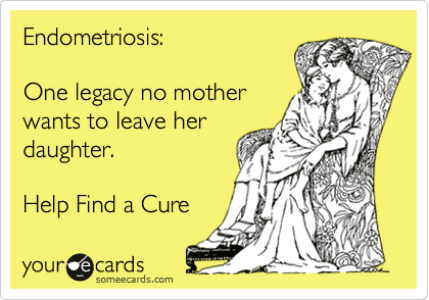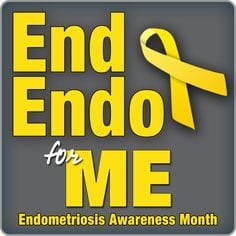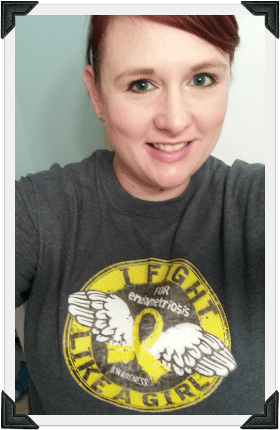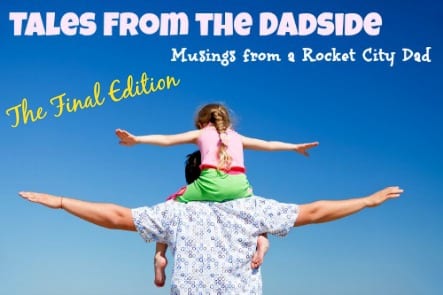Let’s Talk About Your Girly Bits

Okay ladies, it’s time to talk about a subject that’s usually taboo: our girly parts and periods. Let’s talk about Endometriosis. You’ve probably heard of it. You probably know someone who has it. But what do you actually *know* about it?
What if you have it and you don’t even know it?
March is Endometriosis Awareness Month, and I’m trying my best to talk about a taboo subject and spread correct information about the disease. Because I’m MAD! I’m mad that there’s not a better diagnosis, a cure, and better information out there for women who have been living with this disease.
WHO HAS IT?
Endometriosis is found in 176 million women globally – 8.5 million in North America. Statistically, 1 in 10 women have endometriosis, and even more are suspected to be living with it undiagnosed!

If we look at my average RCM post stats, I have about 378 readers per post. Of those of you reading this post today, approximately 37 of you have been diagnosed with endometriosis. Of the rest of you, approximately 22 of you have been misdiagnosed or undiagnosed but are living with endometriosis everyday.
And that’s just you, my RCM readers.
When you apply those numbers to the general female population, it gets pretty scary! Also scary: It will take the average undiagnosed woman living with endometriosis 7-11 years to be diagnosed.
Endometriosis can affect any woman, at any age, of any race and in any socioeconomic situation. It’s also been found in men and children!
There are recent studies that show that sometimes it is gene-related. If you have female family members who have it, you’re more likely to have a gene that predisposed you to endometriosis. If you have freckled fair skin that burns easily and blue or green eyes, you’re more likely to be carrying this gene.
However I repeat: Endometriosis can affect any woman, at any age, of any race, and in any socioeconomic situation.
WHAT IS ENDOMETRIOSIS?
According to the Mayo Clinic, “Endometriosis is an often painful disorder in which tissue that is similar (BUT NOT THE SAME) as the tissue that normally lines the inside of your uterus — the endometrium — grows outside your uterus. Endometriosis most commonly involves your ovaries, bowel or the tissue lining your pelvis. Endometriosis can cause pain — sometimes severe — especially during your period. Fertility problems also may develop.”
From the Endometriosis Research Center (the best info center on endometriosis, hands down):
CRIPPLING PERIOD PAIN IS NOT NORMAL! Our culture of menstrual misinformation and societal bias often tells us the following “taboo” symptoms are “part of life” because “we are female:”
- Pelvic pain that gets worse after sex or a pelvic exam
- Chronically heavy or long periods
- Bowel or urinary disorders associated with periods
- Painful sexual activity
- Significant lower back pain with menses
- Allergies, migraines or fatigue that tends to worsen around menses
- Crippling menstrual pain
We are often taught these symptoms are routine or that we shouldn’t talk about them. This is wrong. THESE ARE SIGNS OF ENDOMETRIOSIS.
I also want to add, that many of the women (research speculates up to 30%) who have severe endometriosis do not report crippling pelvic pain. I had the most severe stage of endometriosis – with a softball-sized endo tumor and a few other benign tumors scattered around – and was only mildly uncomfortable. However, I did have weird symptoms that caused me to go to from doctor to doctor for years, until my endometriosis was caught. I just knew deep down inside, something wasn’t right. And I was correct.
Some of my symptoms:
- Serious fatigue
- Inexplicable depression, anger, and anxiety that wasn’t better with antidepressants or antianxiety medication (think perma-PMS all day every day)
- Irritable bowel syndrome
- Exercise intolerance (I’d work out for a normal 45 minutes and be wiped out for days)
- Constantly falling sick to every little cold or virus that went around.
I had weird heavy hurty periods, but I had those since middle school, so that was normal for me. I just popped a few Ibuprofen and powered through. Turns out, the weird period stuff? Might have been endometriosis the entire time. Since I was in 7th grade. Take this seriously, folks. If not for you, then for your daughters.

HOW IS IT DIAGNOSED?
The “gold standard” of endometriosis diagnosis is laparoscopic surgery.
This disease affects HOW MANY WOMEN and the only way we can diagnose it is via surgery? Yes. Sometimes if you have an endometrioma (a tumor full of endometriosis) it will show up on a CAT Scan or an ultrasound. But most of the time it has to be diagnosed by color in comparison to the healthy pink surrounding tissue.
The average woman will suffer through years before being properly diagnosed. If I had been diagnosed years earlier there’s a chance we could have done something to halt its progress in my body. I might have had a chance to have a baby, or be a better mother to the child I do have. Instead for those years I was going from doctor to doctor, test to test, telling them “I know something is very very very wrong” and being gently told it was “all in my head”.
It took a way wacked-out blood test and a softball sized endometrioma to get anyone to take me seriously.
And that, ladies, is why we’re talking about this today. If I can get an earlier diagnosis and treatment for just one of you, my dear readers, then I will consider this article a success.
HOW IS IT TREATED?
There is no cure.
You will hear people spout off “cures”: hysterectomies, getting pregnant, hormone suppressants, menopause, and birth control are all popularly suggested treatments.
But they are just treatments… not a cure.
There is always a chance that the endometriosis will grow back.
Endometriosis sucks. That’s the bottom line.
WHAT CAN WE DO?
Talk about it
In 1982, Susan G. Komen passed away from breast cancer and her sister made a promise to end breast cancer forever. As a result of the Susan G. Komen fund and awareness campaign, more women are able to survive breast cancer, more women screen for it, there are better diagnostic tools, and the federal government spends $850 million each year in research, treatment, and prevention.
It’s hard to talk about our girly parts, but what if we did? What if we truly told all of our friends and family members about endometriosis and spread the word? When women started talking about breast cancer, the world obviously listened. Why not talk about endometriosis?
If someone had told me, “Hey, you might have endometriosis” maybe I could have mentioned it to one of my doctors. Maybe I could have found it earlier. If my doctors had more patients asking about it, maybe they would have been more informed about how to detect it.
If we spread facts instead of misinformation, maybe we could help other women who have be undiagnosed find answers. Maybe one of you reading this post has been living with some of the symptoms I described above, and are just dealing with it, just powering through. We tend to do that as women.
Don’t “deal with it” any longer. Ask questions. Get help.
Learn about it
Learn the symptoms. Tell your doctor. Tell your friends.
Below are several great websites that will help you learn more:
www.endocenter.org
endometriosis.org
www.endozone.org
Quick informative video: You Can Fight Endometriosis
Endometriosis from Endometriosis.org on Vimeo.
If you have a great doctor treating your endometriosis, tell others. Good endometriosis doctors are hard to find. I had to go through several and it was only by word of mouth from other “endosisters” that I found my current doctor in Birmingham.
Volunteer for studies
One of the best ways that medicine can learn more about this disease is by studying those of us who currently have endometriosis.
I have already participated in a study that is working to identify the gene that causes endometriosis, and another that looks at a connection between joint flexibility and endometriosis. There are a bunch of other studies out there too. For most of them you do need an active surgical diagnosis of endometriosis.
Try some of these:
www.endtoendo.com (the DNA/gene research study)
www.violetpetalstudy.com (studying investigational pain medicine on endometriosis patients)
www.healthcentral.com (a list of active studies, vetted by Clinical Research Corner)
There’s even more out there. But if you’re wandering around the Internet looking for research studies, make sure that they’re legit before you participate.
To Recap:
- Crippling pelvic pain is never normal.
- Feeling like something is “definitely wrong” is never normal.
- Endometriosis can affect any woman at any time in her reproductive life.
- While there is not absolute cure, there are ways to control the disease and treat the symptoms.
- Science is constantly learning more about this disease.
- While it is painful, it is not hopeless!
So tell a friend, a sister, a family member about endometriosis. Let’s talk about the taboo.




